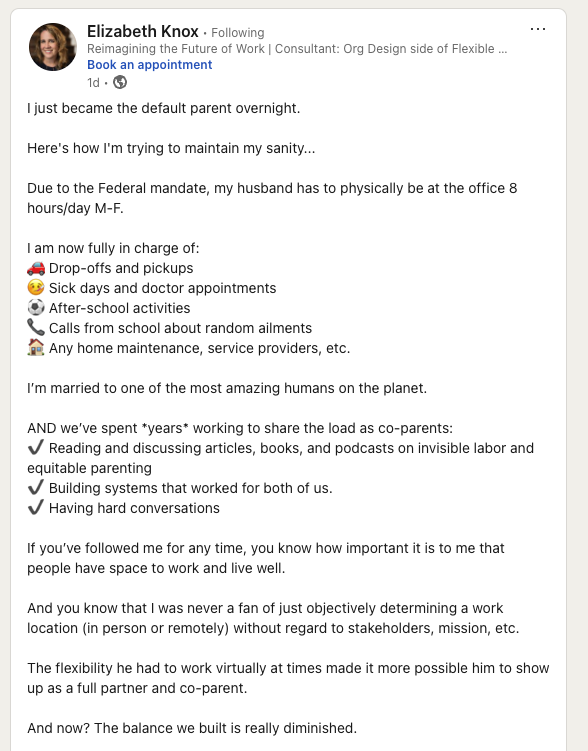Rigidity is Stupidity
Yesterday, I came across a LinkedIn post that really hit home.

A woman shared how overnight she had become the default parent because her husband, a federal employee, was forced back to the office full-time. Gone was the flexibility that let them share the load. Now, she’s juggling drop-offs, sick days, school calls, activities, and home care tasks — alone.
She and her husband had spent years building a co-parenting partnership—talking about invisible labor, creating systems, having hard conversations.
One policy change erased it all overnight.
I’m also married to a federal employee.
He’s been an engaged co-parent not just because he wanted to be, but because flexible policies made it possible.
When our kids were little, he worked a compressed schedule, covering childcare 2–3 days a month while I worked—saving us money and, more importantly, strengthening his bond with our kids.
When the kids got sick, we took turns. One of us could work from home, making sure they were okay without falling behind at work.
His need for flexibility was never about slacking off. It was about adjusting his location and schedule to work smarter. It meant he could walk the dog on his lunch break instead of wasting an hour in traffic. It meant he could support his aging parents while remaining fully available to his team. It meant showing up for his family—without missing a beat at work.
And it’s not like he never went to the office. He’s a professional—he goes in, attends in-person meetings when needed, actively manages his staff, and gets the job done. Like millions of other responsible adults, he doesn’t need to be micromanaged.
But he valued flexibility—and he needed it— to help us balance and share the load as two working parents with caregiving responsibilities for both our kids and aging parents.
Now — that flexibility is gone.
And with it, his ability to show up for our family—and for me—so I can do my job too.
And here’s what’s maddening: We proved flexibility works. So why are we even still having this conversation?
I ask myself:
❌ Do these leaders really not see what their workforce needs?
❌ Are they so privileged that they don’t realize how work actually gets done?
❌ Why are organizations so ready and willing to let talented people burn out or quit rather than intentionally creating smarter solutions?
Or—let’s be blunt—is this just a slow-burn strategy to shrink the workforce?
“Make work unbearable so people quit.”
Elon Musk has admitted as much.1
Since when did we stop valuing fairness? What happened to the Golden Rule—treating others the way we’d want to be treated?
And seriously—what the heck are we even doing?
No, really—what the heck are we doing?
We’re talking about the people who keep our country running—the ones responsible for critical government functions like the FAA and the TSA. These agencies aren’t just bureaucratic offices; they are essential to security, safety, infrastructure, and public well-being.
These aren’t overpaid bureaucrats. They’re public servants. They care about safety, efficiency, and doing their jobs right.
Yet instead of investing in them, we’re demoralizing, politicizing, and defunding—then blaming them when things collapse.
Punitive measures aren’t the answer. As a leader, I know remote work isn’t always easy to manage—it requires intention, trust, accountability, and a commitment to helping people succeed.
I also know that when work isn’t a constant battle, people bring their best.
So when companies and agencies impose rigid policies instead of trusting their workforce, I have to ask—who does this really serve?
Workplace flexibility isn’t new—it’s just smart business.
Not everyone can work from home—but many can. Smart leaders have known this for decades.
My grandparents started a real estate office out of their home in the 1950s. The kids helped out. They built a thriving business—without sitting in a downtown office for eight hours a day.

Did they need to do everything in person? Of course not. Was the phone good enough? Many times, yes.
Workplace flexibility isn’t new, it’s smart business2 and a catalyst for innovation.3
And When Families Lose Flexibility, We All Lose.
🚨 Parents burn out and drop out.
🚨 Partners miss out on meaningful caregiving.
🚨 Businesses lose talent, innovation, and loyalty.
🚨Companies drive away their best people.
And for what? To satisfy leaders clinging to outdated control?
Good leaders understand that a thriving workforce requires a thriving home life. The two are not separate.
This is an ‘everybody’ issue.
Organizations like ThirdPath Institute get this. For twenty-five years, they’ve been helping leaders navigate work-life integration challenges with research-backed strategies that prove what should already be obvious:
✅ Flexibility isn’t a perk—it’s smart business.
✅ Outcomes matter more than hours in an office.
✅ When caregivers can fully participate, families thrive.
✅ Hold people accountable for results, not rigid schedules.
Learn more about ThirdPath here or, donate to help advance their work.
At the end of the day, this isn’t about politics, it’s about common sense.
We can build something better— so why don’t we try?
P.S. I’ll be speaking at ThirdPath’s 2025 Virtual Parents Forum (Feb 21, 26, & 28) This event offers practical tools and strategies to help parents reclaim control of work, family, and personal well-being. Join me! 📅 Learn more here.
Remotify: Elon Musk admits the truth: most return to office mandates are designed to make staff quit ↩
McKinsey & Company: "Americans are embracing flexible work—and they want more of it." ↩
Future Forum Pulse: Offering employees flexibility fuels company culture and productivity
[edited to correct links] ↩

Member discussion